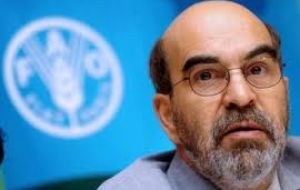MercoPress. South Atlantic News Agency
Brazil’s former Food Security minister voted next FAO Director General
 Graziano da Silva: FAO must work more transparently
Graziano da Silva: FAO must work more transparently The United Nations’ food agency, FAO, elected Brazil’s Jose Graziano da Silva as its Director General, the first new leader in almost two decades as the world faces near-record food prices that are driving millions into poverty.
Graziano da Silva, 61, former Brazilian Minister of Food security will replace Senegal- born Jacques Diouf after 18 years at the head of the biggest UN agency. The Brazilian candidate got 92 votes against 88 for Spain’s Miguel Angel Moratinos, the FAO said in an e-mailed statement. Graziano da Silva takes office January first until 31 July 2015.
World food prices tracked by the FAO rose to a record in February, and the World Bank says costlier food has driven 44 million people into poverty since June 2010.
There were a total of 180 votes cast by the FAO 191 member countries, the FAO said. Other candidates were Austria’s Franz Fischler, Indonesia’s Indroyono Soesilo, Iran’s Mohammad Saeid Noori Naeini and Iraq’s Abdul Latif Rashid.
The FAO, set up in 1945 as a specialized UN agency, says it leads international efforts to defeat hunger and helps developing countries improve farming. The mandate of the agency, whose headquarters moved to Rome from Washington in 1951, includes raising nutrition levels and agricultural productivity.
The FAO has a 2.2 billion US dollars budget for the two-year period through 2011, with 45% from contributions by member countries and the remainder provided through voluntary payments by members and other donors.
Graziano da Silva was in charge of former Brazilian president Lula da Silva’s “Zero Hunger” plan started in 2003. The plan reduced hunger in Brazil by half and cut the percentage of Brazilians living in extreme poverty to 4.8% in 2009 from 12% in 2003, according to the FAO, which awarded Lula da Silva the 2011 World Food Prize for “Zero Hunger.”
The FAO must work more transparently and “free staff from time-consuming bureaucratic procedures,” Graziano da Silva said in a statement before his election. “Country offices need to enjoy greater autonomy in initiating and implementing projects.”
Graziano da Silva has been the FAO’s regional representative for Latin America and the Caribbean as well as an assistant director-general since 2006.
Diouf, 72, was elected on November 1993 and began the first of three six-year terms in January 1994, with his final term starting in January 2006. Diouf’s Lebanese predecessor Edouard Saouma also served three terms as the head of FAO. The FAO’s governing conference in 2009 limited the post to a four-year term, renewable once, after already setting term limits in 2003.
The agency’s income climbed to 2.21 billion for the 2008- 2009 biannual period, from 1.87 billion in 2006-07, 1.56 billion in 2004-05 and 1.41 billion in 2002-03 as both member- country payments and voluntary contributions increased.
A 417-page evaluation report published in September 2007 found “a great need for change” in FAO, and absence of reform would likely lead to “accelerating decline.” The FAO was called “conservative and slow to adapt,” with a “heavy and costly bureaucracy” that created a centralized and risk-averse corporate culture.
The FAO funding fell 31% between 1994 and 2005, and staffing dropped 25%, according to the evaluation report. FAO finances were “dire” and “rapidly deteriorating,” and concerns by member states about FAO priorities and effectiveness were “well-founded,” according to the report.
Relations between the FAO headquarters and field operations followed “an ‘all things lead to Rome approach’ which has been high on costs and low on benefits, with an absence of shared goals,” the 2007 report concluded.
Graziano da Silva said FAO should bolster its capacity to help countries design and implement hunger-eradication plans.
“I subscribe to the view of FAO founders that ending hunger is entirely possible,” the Brazilian director-general elect said in the statement before the election. “Ending hunger is not a charity, but an investment in our poorest people and a key to sustainable development”.




Top Comments
Disclaimer & comment rules-

Read all commentsGreat!
Jun 27th, 2011 - 11:23 pm 0Brasil didn't get the UNSC seat it so wanted,
but Lula's oft stated desire to remove starvation (and poverty) has probably helped one of his appointments to the top post of the UNFAO.
Hope it all works out well for both him and the world.
Commenting for this story is now closed.
If you have a Facebook account, become a fan and comment on our Facebook Page!